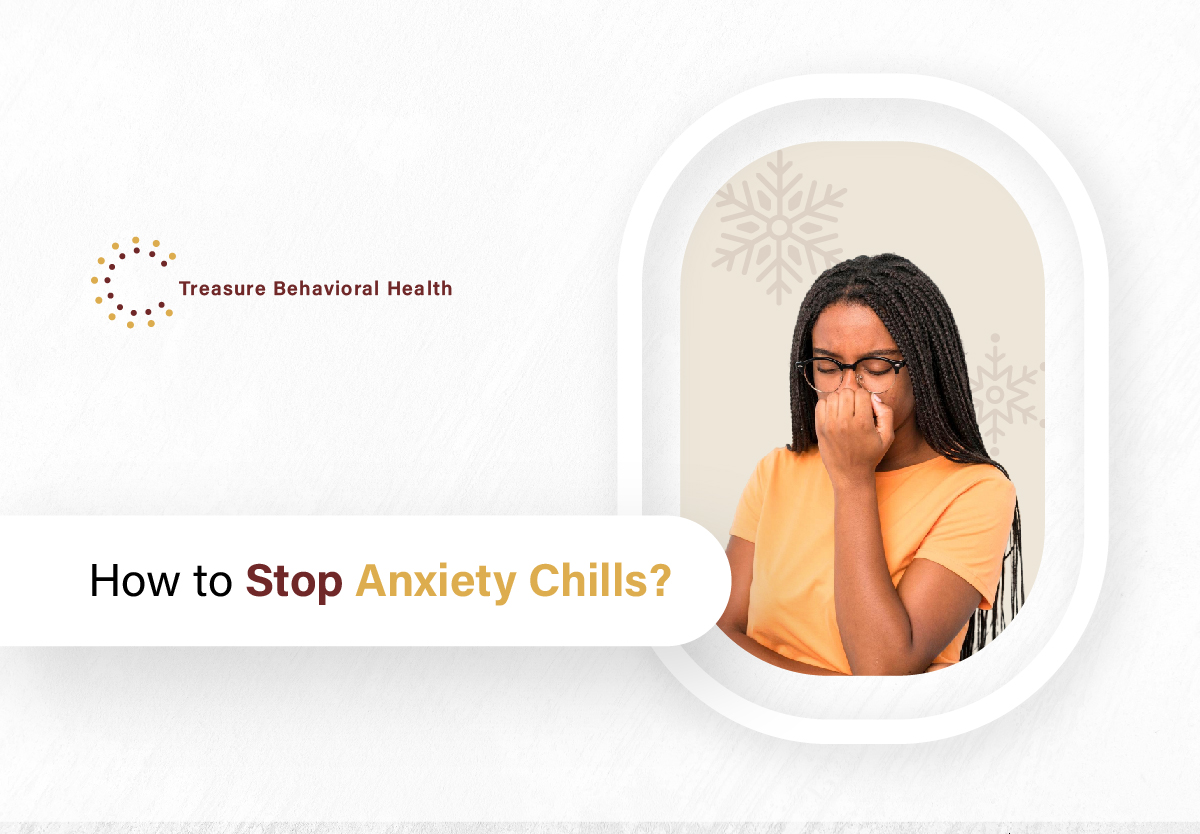Anxiety makes your body prepare for danger by reacting with a survival response.
Getting anxious can cause anxiety chills or anxiety shivers, where your body temperature gets worse.
Chills are not dangerous but can be uncomfortable. It is possible to stop them.
Feeling chills and anxiety in your daily routine and looking for relief?
If that is the case, Dr. Roberta Iyamu at Treasure Behavioral Health understands what you are experiencing.
Keep reading to find out how to stop anxiety chills.
What Is Anxiety?
Let’s first get to know anxiety before we discuss how to stop anxiety chills.
Anxiety is your body pitching as a stress reaction. Moments of stress can lead to feelings of fear, worry, or discomfort.
It is okay to sense anxious vibes during hard times, it may even serve as your safeguard.
However, prolonged or severe anxiety can disrupt your everyday routine.
Various forms of anxiety disorders exist:
- Generalized Anxiety Disorder (GAD)
- Social anxiety disorder
- Post-Traumatic Stress Disorder (PTSD)
- Specific Phobias
- Obsessive-Compulsive Disorder (OCD)
Understand Anxiety Chills
Anxiety chills show as sudden shivers across your body during periods of anxiety. They arise because your body perceives danger and prepares for fight or flight.
This response can tense your muscles, increase your heart rate, and cause fluctuations in body temperature. Sometimes, sweating to cool down can lead to these shivers.
While they may occur intermittently with short-term stress, individuals with ongoing anxiety might experience them more frequently, especially those with panic disorder or specific phobias.
Learning effective anxiety management techniques can help reduce these discomforting symptoms.
Does Anxiety Cause Chills?
Yes, anxiety can cause chills in some people. Various responses can occur in a person’s body due to the stress reaction.
Chills are typically associated with cold climates, but they can arise in a warm environment if accompanied by a cold sensation from anxiety.
Feeling cold with anxiety is a common symptom for many individuals.
Let’s talk about why anxiety brings shivers.
- Feeling nervous may raise adrenaline, shrinking your veins. This gives cool feelings and goosebumps.
- If you are worried, faster and shallower breaths are more common. It is known as hyperventilation, this lowers carbon dioxide in your blood. It can give dizzy feelings and often a cold sensation.
- Anxiety can also cause lots of sweat. As sweat evaporates from your skin, it cools you down, making you feel cold.
- Anxiety often results in tensing of muscles, leading to shaky feelings and spasms that feel like shivers.
- Lastly, our bodies respond to anxiety with “fight or flight” action. This yields several bodily changes, including fluctuating body temperatures causing chills.
How to Stop Anxiety Chills?
Strategies for calming anxiety chills and their effects are:
- Breathing Exercises: Breathe deeply, pause, then breathe out slowly. This cycle can soothe you.
- Visualizing Calm: Imagine a peaceful space. Detail it in your mind. It can ease your mind and body.
- Muscle Relaxation: Tighten various body muscles, then release them. This can cut down stress and boost comfort.
- Yoga: Certain yoga positions can trigger your relaxation response making you less nervous.
- Mindfulness: Focus on the now. Observe your mind’s activity and feelings, do not critique them.
Professional Help for Anxiety Chills
Getting professional support is crucial for managing persistent anxiety chills and related symptoms.
Therapy with a counselor is a way to help with anxiety chills and other symptoms. Following are different types:
- Cognitive Behavioral Therapy (CBT): Talk with a counselor to recognize and change negative thinking habits.
- Exposure Therapy: Slowly face stressful thoughts and become less sensitive.
- Psychodynamic Therapy: Focus on understanding why you think and act as you do to improve how you handle stress.
Lots of medicines can ease anxiety and shivering. A doctor could prescribe antidepressants or pills for anxiety if necessary.
With every medication having its unique effect, a chat with the doctor to highlight the best match is vital.
Managing Anxiety Chills Through Lifestyle Changes
- Exercise Regularly: Physical activity lowers anxiety and reduces how often chills occur.
- Healthy Diet: A balanced diet supports overall well-being and stabilizes mood, crucial for chills and anxiety
- Get Enough Sleep: Restful sleep helps prevent anxiety and reduce chills.
Conclusion
Anxiety chills can feel unsettling, and even scary, but knowing their cause and how to stop anxiety chills can help a lot.
Simple relaxation methods, changes in your daily manner of living, and getting expert help if needed can lessen these chills’ intensity.
Improve your life’s overall quality. Contact us if you need help in reducing your anxiety symptoms.
FAQs
Q: Is shivering a sign of anxiety?
Anxiety often makes one shiver, since stress tenses muscles. And it can lead to feelings of cold or shaky unease.
Q: Why do I get cold when anxious?
Anxiety might make your body react in a way that limits blood flow to your limbs. You might feel cold, even when the temperature is regular.
Q: Can chills be caused by stress?
Yes, stress may start your body’s fight-or-flight reaction, which can bring on chills.
Q: Can anxiety cause the chills?
Yes, anxiety can cause various physical symptoms, including chills. But these chills are associated with certain types of anxiety and not all forms of it.
Q: Does being cold make anxiety worse?
Yes, feeling cold can sometimes exacerbate anxiety symptoms, creating a feedback loop that leads to more chills.


No comment